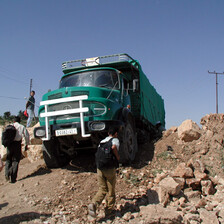The Electronic Intifada 23 August 2005
In 2002, Moshe Ya’alon, then Israel’s army chief of staff, said that “the Palestinians must be made to understand in the deepest recesses of their consciousness that they are a defeated people.” I wonder if Ya’alon would make the same statement today after the completion of Gaza settlers evacuation? Whether right or wrong, whether Ya’alon likes it or not, today most Palestinians in the Occupied Territories and in the diaspora, young or old, women and men do feel in the deepest recesses of their hearts that they are the victors. We witnessed a day that was made fact by their blood, struggle, and patience. They believe today that they harvested what they planted during the last 38 years of steadfastness.
 Saying or feeling this is not to deny the bleak fact that most Palestinians are aware of Sharon’s plan to sacrifice the Gaza colonies so that he can maintain those in the West Bank. We know that many of the settlers moved straight from Gaza to the West Bank and Sharon announced that Israel will keep building new settlements there. We know that Gaza represents only 1.6 percent of historic Palestine and has never been of any strategic or biblical importance for any Israeli government. For Israel, Gaza has always been a demographic, security and economic burden. During the 1970s and 1980s Israeli leaders often talked about Gaza as a bargaining chip they were ready to give up, and it was the first area they handed over to limited Palestinian control under the Oslo agreements in the 1990s. Everyone knows that Gaza cannot stand by itself as an independent entity, but is an inseparable part of the Palestinian nation.
Saying or feeling this is not to deny the bleak fact that most Palestinians are aware of Sharon’s plan to sacrifice the Gaza colonies so that he can maintain those in the West Bank. We know that many of the settlers moved straight from Gaza to the West Bank and Sharon announced that Israel will keep building new settlements there. We know that Gaza represents only 1.6 percent of historic Palestine and has never been of any strategic or biblical importance for any Israeli government. For Israel, Gaza has always been a demographic, security and economic burden. During the 1970s and 1980s Israeli leaders often talked about Gaza as a bargaining chip they were ready to give up, and it was the first area they handed over to limited Palestinian control under the Oslo agreements in the 1990s. Everyone knows that Gaza cannot stand by itself as an independent entity, but is an inseparable part of the Palestinian nation.
Still, knowing this does not temper the feeling of victory. Today, August 23 2005, we witnessed the clearing of the last Israeli colony in the Gaza Strip, Netzarim, which Sharon once said was an essential part of Israel no different than Tel Aviv. Dismantling the illegal settlements in Gaza is a severe blow to the core the Zionist ideology that is built on colonization and expansion.
This victory corrects one of the famous principles of Ben Gurion, the first Israeli Prime Minister, who was quoted saying that: “war will give us the land and we will work to empty it. The concepts of ‘ours’ and ‘not ours’ are peace concepts only and in the war they lose their whole meaning.” In Gaza, it was Palestinian steadfastness that drew the line between “ours” and “not ours.” It succeeded in puncturing Zionist belief and practice, even if Israel does not yet publicly admit that what is “not ours” cannot be kept. And if struggle gave Palestinians the land then, Palestinians will also work hard to build it.
Palestinians are convinced today that this evacuation must be repeated throughout the West Bank. It took the Israeli army only six days to remove the Gaza settlers despite their expectations that they needed six weeks. It went smoothly and without any excepted violence — except of course the violent attacks by settlers inside Israel and in the West Bank against Palestinians, killing eight of them. Palestinians fully understand that there was a political will on the part of Sharon’s government to dissolve the Gaza colonies in order to maintain and hold the occupation in the West Bank, which is why it went ahead, not because of anything done by the international community. It is the world’s duty now to push Israel forward to dismantle the colonies in the West Bank so that the Palestinians can build what Bush promised, “a viable Palestinian state.”
There is a well known legal maxim that says “ubi jus ibi remedium”: where there is a right, there is a remedy. All Palestinians know that our rights are enshrined in international law, and we will never give up our struggle to win them back. But we do not yet know if the international community will also show the same political will and steadfastness to help us regain them.
Ghada Ageel, a doctoral student at Exeter University, lives in Gaza’s Khan Yunis refugee camp where she was born. Her family are refugees from the village of Beit Daras that was situated near the Israeli port of Ashdod until 1948.
Related Links





